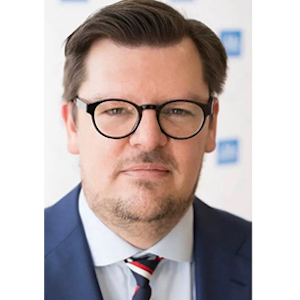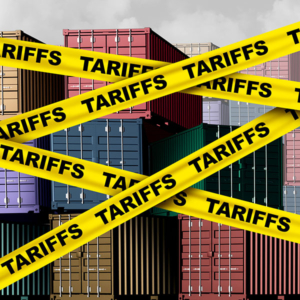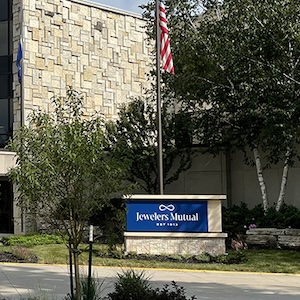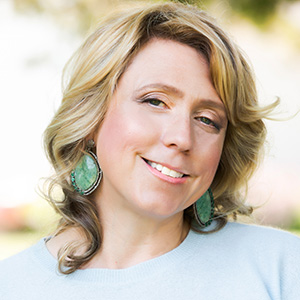
Continuing my resolution to speak to more people I don’t entirely agree with, I was happy to chat at JCK Las Vegas with Tom Neys (pictured), head of media relations for the Antwerp World Diamond Centre (AWDC).
Since joining the Belgian industry group in November, Neys has had the unenviable task of trying to convince the world that, post-Ukraine invasion, Belgium should keep importing Russian diamonds. (Russian gems have been excluded from European Union, though not U.S., sanctions.)
I doubt our spirited conversation changed either of our minds, but his thoughts on a rating system for diamonds—reminiscent of the once-unpopular KP Plus—was intriguing.
Edited highlights of our talk follow.
Can you discuss why you think it’s important and why you feel people like me—and now the Kimberley Process Civil Society Coalition—are wrong when we say people shouldn’t buy Russian diamonds?
I’m not defending Russian diamonds. I’m defending the right of companies to choose what they do with their business.
First, there’s the legal aspect. In Europe, it’s perfectly allowed and legal to trade these diamonds.
Secondly, ethically, this is a complicated situation. It cuts both ways. If you stop selling Russian diamonds in Antwerp, that has an impact on thousands of people’s lives and livelihoods.
If we stop trading Russian diamonds in total, you’re going to disrupt the market. And that’s never a good thing. I don’t think it’s up to trade hubs to decide how you’re going to disrupt a market.
The third thing is, if we stop doing this, we know that a lot of more diamonds will go to other trade hubs or will be traded directly. If you stopped trading in Russian diamonds [altogether], you are going to create a new black market, and we will go 20 years back in time—back to a situation where we have no control over what’s happening. And that’s what we absolutely want to avoid. It’s better to have control and see how we can fix the situation than to throw everything away.
You mentioned that it’s legal to import Russian diamonds in Europe. But that’s something that, from my understanding, the Belgian industry purposely lobbied the EU to do. Correct?
We don’t lobby. Even before the conflict started, I gave several interviews where we stated very clearly our opinion [on sanctions].
The European Union has a philosophy on how they implement sanctions. When Ukraine was invaded, it was decided to only implement sanctions when the effects will be bigger for the adversary than for yourself. If you don’t impact [the adversary], that’s not even a sanction, then you’re doing actually nothing. And then you’re just lying to people and saying, “Hey, we trying to do something.” But you’re actually not doing anything.
You have said that if these diamonds don’t go to Antwerp, they will to go to Dubai, which is “opening its doors to Russian oligarchs.” Yet, even if they do go to Dubai, which I think most are now anyway, you might not be stopping the trade, but you at least are making it more difficult. There has to be a reason companies considered Antwerp their first choice.
Of course, because this is a relationship business. Companies want to be in Antwerp. Why? Because it’s a good market, you get the best value for your product. It’s very simple.
I’ve often heard that Antwerp can’t necessarily compete with all the things that Dubai is doing. Why doesn’t Antwerp set itself apart as the more ethical center, starting with this?
I think that is exactly what we’re doing. Putting Russian diamonds on a sanctions list will create the opposite effect. We are thinking long-term, not short-term. We want to make sure that our industry keeps being transparent for the next 20 years. And the problem is, if you’re make these changes you will create a situation where you will have no control over what will be happening in 20 years. And that is very dangerous.
But let’s talk about the short-term, because obviously, people are currently being killed in the Ukraine. The Russian government owns one-third of the dominant miner there, so Russian diamonds contribute directly to the war. When you see the atrocities in Ukraine, doesn’t that give you pause?
It gives us all pause. It doesn’t make a difference, in a sense of what’s our responsibility. And I’m a total believer in in the power of the consumer. I’m not pushing Russian diamonds here. I’m saying, let the consumer decide this. And that’s something that companies have an opportunity now to take sides on.
But what I’m [also] saying is, give these companies the opportunity to adapt. If you implement sanctions tomorrow, [they will need to be implemented] in 24 hours. Companies will be stuck.
[Note: The United States sometimes gives “licenses” that allow companies time to implement sanctions.]
What we want is for companies to have the opportunity to say, “Hey, the consumer wants something very different. Okay, let’s do that. Let’s find new suppliers. Let’s find new contacts, new diamonds.”
We need to start believing in the power of the consumer. The consumer is intelligent enough to make decisions. The only thing they need is more information. And that is what we lack today.
Let’s talk about the consumer. I think we can all agree, at least in the United States and Europe, there’s a general revulsion against the Russian invasion. Americans were pouring Russian vodka down the drain.
Consumers want to hit those who are actually doing things wrong in this war. They want to hit Putin, they want to hit the oligarchs who profit from this war.
Don’t you think some of those people are involved in Alrosa? The CEO of Alrosa, Sergei Ivanov, is the son of Putin’s former chief of staff.
I don’t think you can say at this moment that he is involved in the conflict. That’s something I can’t comment on.
But don’t you think most consumers wouldn’t want to support a company so tied in with the Russian government? It owns a one-third stake.
The consumer should be informed. That’s absolutely true. I’m constantly saying, we should make more efforts to let the consumer know where diamonds come from.
But the consumer needs to know the value of this [information]. A good example of how quickly you can change an industry is in Europe. At a certain point, every washing machine had to have a little [energy label]. Is it an A, grade, B grade, C grade? Within a year, this whole industry completely changed. Because consumers had an easy way to know whether a washing machine is good for the environment. So, if I buy an E washing machine, it will be cheaper, but when I sell it secondhand, I will get no money for it. And it’s going to swallow more electricity and consume much more water than a higher-rated washing machine.
Within a year, there was total change. Just by informing the consumer in an independent way, where he could have information, he changed his behavior. I think that’s the way we need to go.
What’s the chance of Alrosa currently being sanctioned like it is in the United Kingdom and the United States?
I don’t see it evolving that way, simply because I think most people now are convinced that it does not solve the problem, not economically. not ethically.
Let’s not be naïve to think that if we’re not going to sell these diamonds, they won’t eventually get sold. So, you will have no impact. And then you can feel better that you took an ethical stance. But how ethical is taking a stance when you’re creating no impact?
I hear a lot of people say, “You need to be able to cut your own flesh to damage the other party.” But in this case, you’re not damaging anything. Just your own country.
If there are EU sanctions against Russian diamonds, wouldn’t people be able to say, “I’m buying a diamond from Antwerp, I have more assurance”?
That’s already the case. Trade hubs absolutely need to have certain standards. And that standard should be very simple. It should have good anti-money laundering, anti-terrorist financing [controls]…
The jewelry industry should say we don’t buy from trade hubs that don’t comply with certain standards.… We have seen what has happened with the [Financial Action Task Force putting Dubai on the gray list]. That’s not us; it’s public record. We have said there’s a difference in how we regulate our exports, and how they do.
How many Russian diamonds are coming into Antwerp? From what I hear, March and April were quiet, but in May they started to be sold again.
I don’t know. Simply because the Diamond Office is separate from AWDC. We don’t have any access to data from the office, for privacy reasons.
The only information we have is from the street. People are very quiet about what they do now, because they don’t know what will happen.
I know that shipments are taking a very long time. But that’s just typical for every situation today. Everything has to be triple-checked. Some companies are very careful in their decisions, given the uncertainty.
Is it safe to say that you’ve gotten a bit of flak from your position? Has that been difficult?
I think you’re wrong there. If you put all the pieces of the puzzle together, I don’t think we are defending a difficult position, in the sense of, you’re not creating a solution with sanctions, you’re only creating more problems. I have no problem defending Antwerp’s position.
And yet, your position’s received a lot of negative reaction from the local press.
You see that as negative? I see that is as inquisitive.
OK. Well, I’m inquisitive too.
That’s how it should be, Rob.
Photo courtesy of Antwerp World Diamond Centre
- Subscribe to the JCK News Daily
- Subscribe to the JCK Special Report
- Follow JCK on Instagram: @jckmagazine
- Follow JCK on X: @jckmagazine
- Follow JCK on Facebook: @jckmagazine






